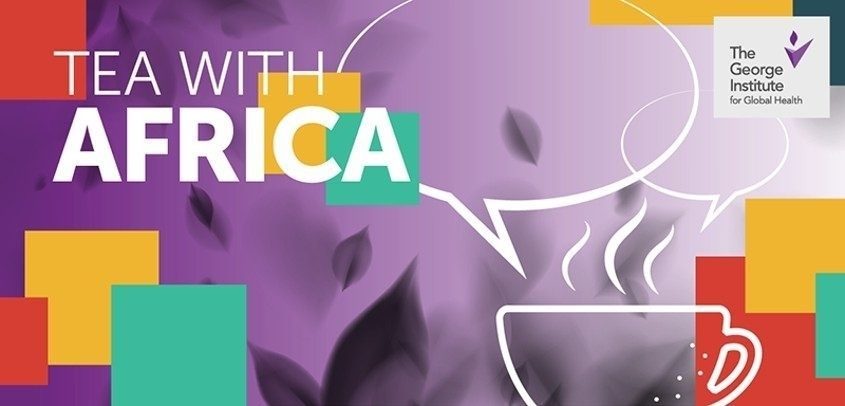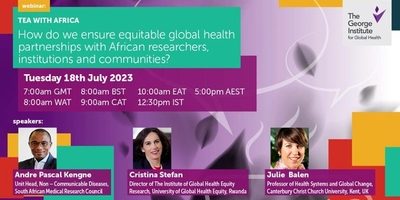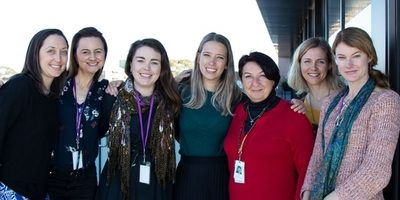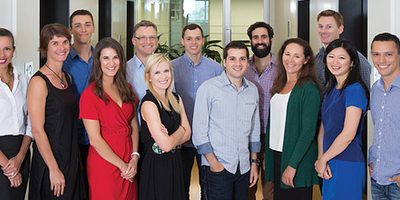
Blog: Key reflections from the Tea with Africa session on How do we ensure equitable global health partnerships with African researchers, institutions and communities?
Recently The George Institute for Global Health hosted a discussion aimed to promote pragmatic and culturally sensitive approaches to establishing and sustaining equitable global health partnerships, specifically with African researchers, institutions, and communities.
The discussion on 18th July 2023 built on the growing global discourse on health equity and decolonialisation of global health. Feeding into the context, The George Institute has a stream of work dedicated to embedding equity-considerations in global health research partnerships (see here and here). This work, as well as several internal conversations to integrate justice, equity, and dignity into its operations, led to the topic for this "Tea with Africa" session.
The session was moderated by Dr. Kenneth Yakubu, a Research Fellow at The George Institute who also co-leads the institute’s initiative for partnerships with African researchers and institutions. The panellists were Prof. Julie Balen, a Professor of Health Systems and Global Change at the Canterbury Christ Church University, Kent, United Kingdom; and Professor Andre-Pascal Kengne, Unit Head, Non-Communicable Diseases, South African Medical Research Council. Perspectives were purposefully sought from African and non-African researchers.
Beginning the conversation from a strength perspective, Yakubu asked the panellists to share specific examples of research partnerships they have been a part of, what worked in those partnerships, and how they reflected equity, before moving on to discuss the challenges and the shifting norms and expectations for equitable partnerships in Africa.
Examples of Equitable Global Health Partnerships in Practice
Prof. Balen began by sharing two examples of equity-driven global health research projects she participated in: The NIHR Global Health Research Group on Digital Diagnostics for African Health Systems and The White Rose Interdisciplinary Network on Fertility Care in the Global South. She noted that in these projects, equity-focused reflections and practices were not a one-time check-box activity to be completed and then forgotten, but rather an ongoing collective learning and adaptation process that occurred throughout the engagement and research cycle. This entailed continuous dialogues reflecting on the equity principles and collectively identifying methods and mechanisms to translate them into practice. Equity-focused considerations are frequently centred on the lived experiences and needs of the study population, particularly those from under-represented groups and communities. Prof. Balen further observed that these reflective dialogues also created safe spaces for research team members to express their concerns and resolve conflicts in a respectful manner.
Prof. Balen explained that in the NIHR Digital Diagnostics Group project, for example, having two joint Principal Investigators (PIs), one from the UK and another from Burkina Faso, helped to ensure shared ownership and decision-making among the project leads. This is important since the group included over 50 collaborators from 8 different countries, namely: Burkina Faso, Ghana, Kenya, Sudan, The Gambia, The Netherlands, UK and Zambia. A capacity-strengthening plan involving 10 African PhD students was developed, and gender disparities in access to resources and growth opportunities were identified with attempts by the team for these to be addressed.
Prof. Kengne reflecting on his involvement with establishing the Chronic Kidney Disease in Africa (CKD-Africa Collaboration), noted that they had a Memorandum of Understanding (MoU) which laid a strong foundation for equitable partnerships. The MoU outlined clear objectives, expectations, and potential benefits, as well as opportunities for new researchers to contribute to the project. Prof. Kengne emphasised that the MoU was crucial for ensuring team member’s commitment to an equitable partnership. The MoU outlined procedures to be followed to protect the interests of the researchers and evaluate their contributions fairly. Prof. Kengne added that, in order to ensure implementation of equity principles captured in the MoU, team members were transparent in their task allocation, communication of progress, and reaching out for support.
Challenges to Developing Equitable Global Health Partnerships
Geographical and disciplinary barriers: Prof. Balen noted that since the Digital Diagnostics network (which preceded the NIHR Group project) was set up in April 2020, when team members could not travel due to the COVID-19 pandemic, the physical distance between researchers was a challenge to setting up an equitable global health partnership. The team had to explore alternative methods of engagement, including webinars and online meetings which helped them break down the geographical barriers. Secondly, she recognised that despite the efforts to ensure equity in partnerships, there remained power imbalances and hierarchies, including within and across disciplines involved in the project. Prof. Balen added that it was crucial for team members from different disciplines to listen attentively to each other, emphasising this as a difficult but essential skill in interdisciplinary teamwork. Researchers can help bring different disciplines together by maintaining a sense of curiosity and being receptive to adapting and learning as they progress through the project. Prof. Balen advised that such a collaborative mindset does not guarantee immunity to obstacles, but it does aid in navigating them with sensitivity, while keeping the focus on the collective goals.
North to South flow of funding: Prof. Kengne highlighted that the missing link in ensuring equitable global health partnerships remains low local funding which often leaves African researchers dependent on the foreign funders and their western counterparts. Prof. Kengne shared that as a member of the South African Medical Research Council's leadership, he was able to ensure the CKD-Africa Collaborative had access to necessary funding in the early years of its operations, thereby significantly reducing their reliance on external funding. With the initiative expanding and also the number of scientists involved with it, Prof. Kengne expressed concerns about the anticipated funding challenges the collaborative will face. He explained that a lack of funding makes it difficult to ensure sustainability, and the growth of such equitable partnerships.
In her reflections on this important point, Prof. Balen noted that funding organisations were beginning to recognise the need for equitable research partnerships. She alluded, based on her experience on one of the grant review committees, to the panel's concerns for fair and equitable resource allocation, focusing on the cost component designated for partner institutions in the South, where a majority of the research is often conducted. However she noted that this is an example of just one funder and agreed that there was still a huge need to improve the financing of African research to ensure local researchers have access to the resources they need.
Changing Trends in Expectations for Equitable Global Health Research in Africa
Prof. Balen and Kengne both stated that there has been an increase in the number of African scholars (both on the continent and in the diaspora) who are speaking out against the historical injustices and power imbalances in global health partnerships; this is particularly evident in the growing work on “decolonising global health”. However, Prof. Balen noted that despite the fact that community engagement and involvement are critical requirements for equitable research partnerships, she is doubtful of the extent to which these ideas have reached beyond academia to have impact on African communities.
Additional remarks from the panellists
Even with the best of intentions, ensuring equitable research collaborations is difficult. However, the panellists remained optimistic that through shared ownership, mutual respect and effective collaboration, team members would be able to navigate these challenges.
The panellists advised African and non-African researchers to seek a deeper comprehension of the colonial and post-colonial discourses that influence global health partnerships. They also stressed the need for community engagement and participation throughout the entire research cycle. There are now readily accessible resources that can assist researchers in critically analysing their engagement and contributions, and consequently building more inclusive partnerships.
Finally, Prof. Balen concluded by emphasising the significance of non-African researchers recognising and appreciating African researchers' expertise and the wealth of knowledge that their communities possess. Prof. Kengne also drew the audience's attention to the growing pool of high-calibre African researchers, as well as the need for collaborative efforts in capacity building.






